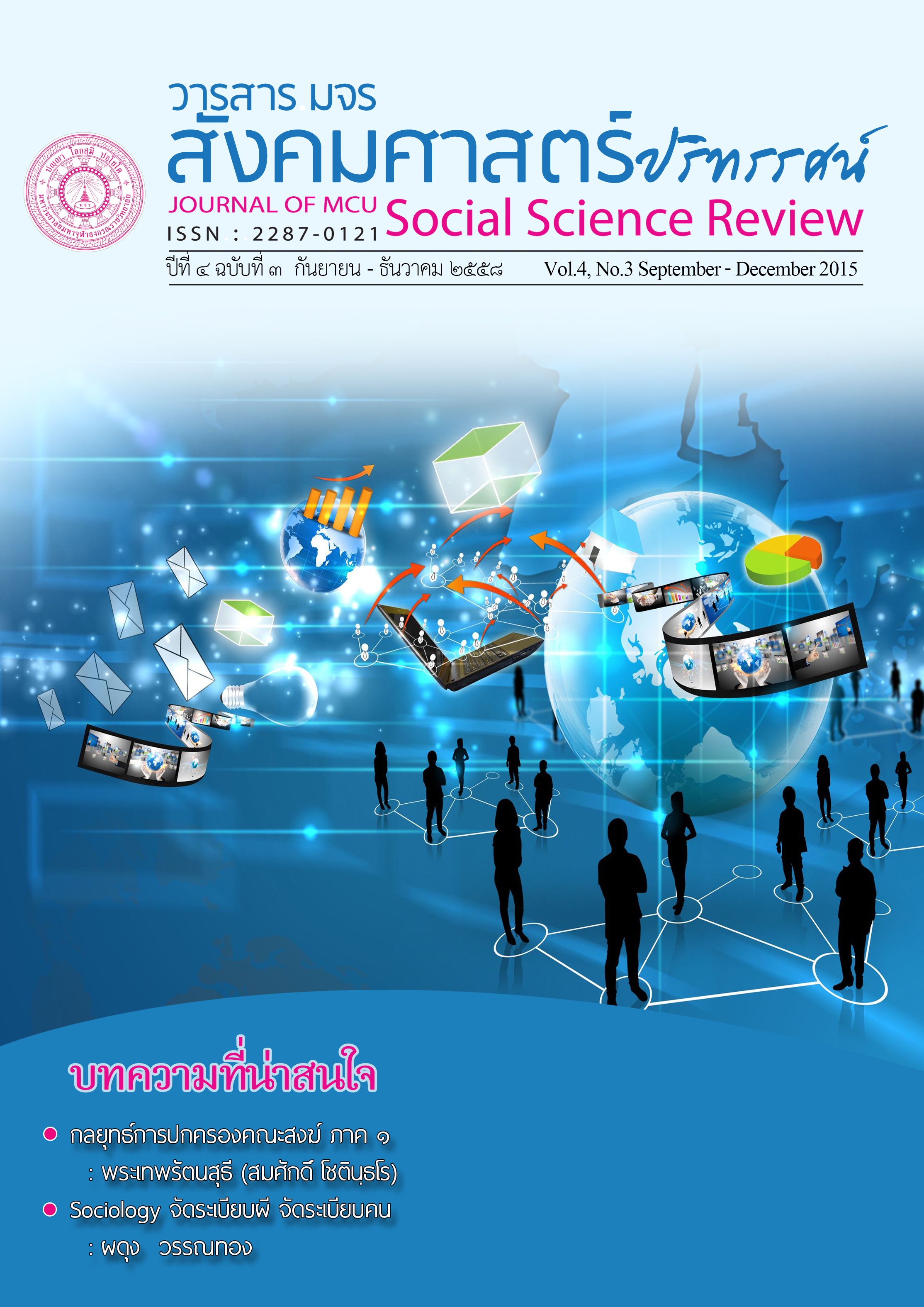LIP Model: กระบวนการนวัตกรรมการเรียนรู้เพื่อการพัฒนาที่ยั่งยืน
คำสำคัญ:
LIP Model, กระบวนการนวัตกรรมการเรียนรู้, ปราชญ์ชาวบ้าน, การพัฒนาที่ยั่งยืนบทคัดย่อ
LIP Model คือรูปแบบของกระบวนการนวัตกรรมการเรียนรู้เพื่อการพัฒนาที่ยั่งยืนของปราชญ์ชาวบ้านภาคใต้ ซึ่งประกอบไปด้วย ๓ กระบวนการสำคัญ คือ กระบวนการสร้างนวัตกรรม(Innovation Creation)กระบวนการนำนวัตกรรมไปใช้(Innovation Utilization) และกระบวนการเผยแพร่นวัตกรรม(Innovation Diffusion) โดยมีขั้นตอนตามลำดับดังนี้ ย้อนแลกำพืด ชอบสืบสรรหา เปลี่ยนใหม่ให้แปลกกว่า ตั้งท่าเตรียมลองใช้ ลองแล้วลองเล่า ทำเฒ่าทำใหม่ ให้สมดุลเอาไว้ และร่วมใจใช้ร่วมกัน เปิดสังคมการเรียนรู้ สมรมอยู่แบบรู้หวัน แตกหน่อทำต่อกัน และถูกผิดมันเช่นนั้นเอง ภายใต้ปัจจัยการมีต้นแบบผู้นำดี มีวิสัยทัศน์ร่วม สวมใส่นวัตกรรม ทำเป็นพลวัต จัดการครบวงจร สอนกันฉันท์กัลยาณมิตร ใกล้ชิดแหล่งเรียนรู้ วิชาการคู่ภูมิปัญญา พึ่งพาเทคโนโลยีที่เหมาะสม และสังคมยอมรับได้เป็นปัจจัยหลักที่ส่งผลให้กระบวนการนวัตกรรมการเรียนรู้ประสบความสำเร็จไปสู่ความยั่งยืน
เอกสารอ้างอิง
(๑) หนังสือ :
กีรติ ยศยิ่งยง. องค์กรแห่งนวัตกรรม : แนวคิดและกระบวนการ. กรุงเทพมหานคร : จุฬาลงกรณ์มหาวิทยาลัย, ๒๕๕๒.
ภาณุวัฒน์ ภักดีวงศ์. ภูมิปัญญาไทยกับการพัฒนาการศึกษา. กรุงเทพมหานคร : สำนักพิมพ์แห่งจุฬาลงกรณ์มหาวิทยาลัย, ๒๕๕๒.
วิจารณ์ พานิช. การจัดการความรู้ฉบับนักปฏิบัติ. กรุงเทพมหานคร : ตถาตา, ๒๕๔๙.
วิชัย ตันศิริ. โฉมหน้าการศึกษาไทยในอนาคต : แนวคิดของการปฏิรูปการศึกษาใน พ.ร.บ. การศึกษา. พิมพ์ครั้งที่ ๔. กรุงเทพมหานคร : จุฬาลงกรณ์มหาวิทยาลัย, ๒๕๔๗.
เสรี พงศ์พิศ. ปฏิรูปสังคมไทย. กรุงเทพมหานคร : พลังปัญญา, ๒๕๕๓.
อมรวิชญ์ นาครทรรพ และคณะ. การศึกษาในวิถีชุมชน : การสังเคราะห์ประสบการณ์ในชุดโครงการวิจัยด้านการศึกษากับชุมชน. กรุงเทพมหานคร : สำนักงานกองทุนสนับสนุนการวิจัย, ๒๕๕๑.
อุทัย ดุลยเกษม และอรศรี งามวิทยานนท์. ระบบการศึกษากับชุมชน : กรอบแนวคิดและข้อเสนอแนะเพื่อการวิจัย. กรุงเทพมหานคร : แปลนปริ้นติ้ง, ๒๕๔๐.
(๒)วิทยานิพนธ์/รายงานวิจัย
พจนี เทียมศักดิ์. “ปฏิสัมพันธ์ของการเรียนรู้ในชุมชนและโรงเรียน”, วิทยานิพนธ์การศึกษาดุษฎีบัณฑิตบัณฑิตวิทยาลัย มหาวิทยาลัยศรีนครินทรวิโรฒ, ๒๕๔๓.
ธวัชชัย เพ็งพินิจ. “คุณลักษณะของปราชญ์ชาวบ้านด้านเกษตรกรรมแผนใหม่ภาคตะวันออกเฉียงเหนือ” , รายงานวิจัย กรุงเทพมหานคร : คณะมนุษยศาสตร์และสังคมศาสตร์ มหาวิทยาลัยราชภัฏสวนดุสิต, ๒๕๕๐.
๒. ภาษาอังกฤษ
(I) Book :
Nonaka, I. and Takeuchi, H. The Knowledge-creating Company : How Japanese Companies Create the Dynamics of Innovation. New York : Oxford University Press, 1995.
ดาวน์โหลด
เผยแพร่แล้ว
รูปแบบการอ้างอิง
ฉบับ
ประเภทบทความ
สัญญาอนุญาต
ลิขสิทธิ์ (c) 2018 วารสาร มจร สังคมศาสตร์ปริทรรศน์

อนุญาตภายใต้เงื่อนไข Creative Commons Attribution-NonCommercial-NoDerivatives 4.0 International License.
เพื่อให้เป็นไปตามกฎหมายลิขสิทธิ์ ผู้นิพนธ์ทุกท่านต้องลงลายมือชื่อในแบบฟอร์มใบมอบลิขสิทธิ์บทความให้แก่วารสารฯ พร้อมกับบทความต้นฉบับที่ได้แก้ไขครั้งสุดท้าย นอกจากนี้ ผู้นิพนธ์ทุกท่านต้องยืนยันว่าบทความต้นฉบับที่ส่งมาตีพิมพ์นั้น ได้ส่งมาตีพิมพ์เฉพาะในวารสาร มจร สังคมศาสตร์ปริทรรศน์ เพียงแห่งเดียวเท่านั้น หากมีการใช้ภาพหรือตารางหรือเนื้อหาอื่นๆ ของผู้นิพนธ์อื่นที่ปรากฏในสิ่งตีพิมพ์อื่นมาแล้ว ผู้นิพนธ์ต้องขออนุญาตเจ้าของลิขสิทธิ์ก่อน พร้อมทั้งแสดงหนังสือที่ได้รับการยินยอมต่อบรรณาธิการ ก่อนที่บทความจะได้รับการตีพิมพ์ หากไม่เป็นไปตามข้อกำหนดเบื้องต้น ทางวารสารจะถอดบทความของท่านออกโดยไม่มีข้อยกเว้นใดๆ ทั้งสิ้น





